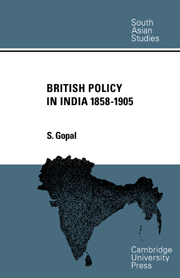Book contents
- Frontmatter
- Contents
- Preface
- Map 1 The Annexation of Burma
- Map 2 Afghanistan and Central Asia
- 1 The Aftermath of The Revolt, 1858–69
- 2 The Conservative Adventure, 1869–80
- 3 The Liberal Experiment—Ripon and Dufferin
- 4 Return to Caution, 1888–98
- 5 Curzon: The Apogee of Administration
- Conclusion
- Notes
- Bibliography
- Index
4 - Return to Caution, 1888–98
Published online by Cambridge University Press: 02 December 2009
- Frontmatter
- Contents
- Preface
- Map 1 The Annexation of Burma
- Map 2 Afghanistan and Central Asia
- 1 The Aftermath of The Revolt, 1858–69
- 2 The Conservative Adventure, 1869–80
- 3 The Liberal Experiment—Ripon and Dufferin
- 4 Return to Caution, 1888–98
- 5 Curzon: The Apogee of Administration
- Conclusion
- Notes
- Bibliography
- Index
Summary
Indian policy was now once more marked by caution; and the ten years after the departure of DufFerin formed a period of marking time. The two Viceroys, Lansdowne and Elgin, though they belonged to opposite parties, were both suited to this mood. For neither was outstanding in ability or in character. Lansdowne, by tradition a Whig, had left the Liberal party in protest against Gladstone's land legislation for Ireland and was Salisbury's choice for the Governor-Generalship, first of Canada and then of India. Lord Randolph Churchill had desired the Indian appointment; but Salisbury had preferred a staider character and offered it to the person whom Milner described as ‘a good average man’. But even Lansdowne was abler than his successor, who was selected by the Gladstone Government—after a soldier with experience of India, Sir Henry Norman, had declined—solely on the grounds that his father had once been Viceroy and that he was Lord Rosebery's friend. Elgin too at first had declined, and was only persuaded with great difficulty by Rosebery to accept. Rosebery had no high opinion of Elgin's abilities, and presumably urged him to go to India because no one better suited was available. Elgin had been convinced that he lacked the ability that would justify the appointment. History has provided us with no reason to differ from his estimate of himself.
In fact, during the tenure of these two acquiescent, unimaginative men, the viceroyalty reached its lowest ebb in the nineteenth century.
- Type
- Chapter
- Information
- British Policy in India 1858-1905 , pp. 180 - 221Publisher: Cambridge University PressPrint publication year: 1965
- 1
- Cited by

